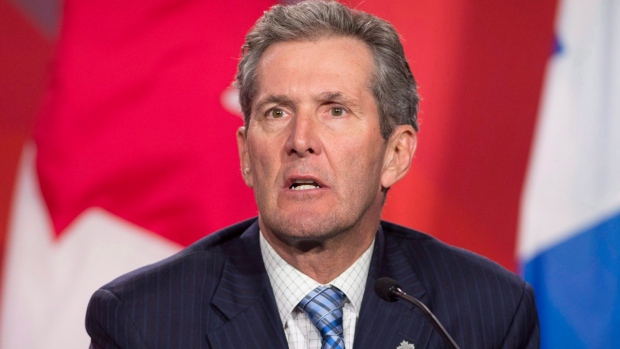Oct 27, 2017
Manitoba defies Feds with new carbon tax rate; Trudeau shoots back
The Canadian Press

WINNIPEG -- Prime Minister Justin Trudeau says his government will impose a higher price on carbon if Manitoba follows through with a plan to keep its carbon tax at only half of Ottawa's goal.
Manitoba Premier Brian Pallister says he will defy the federal government by introducing a carbon tax of $25 a tonne next year and keep it at that rate.
Ottawa is demanding provinces implement a tax that would start at $10 a tonne in 2018 and ramp up to $50 a tonne by 2022.
Speaking in Quebec, Trudeau says there are clear benchmarks provinces are expected to meet and the federal government will be watching.
He says if a province refuses to impose the tax by 2022, the federal government will step in and do it for them.
Trudeau notes that any cash collected through the tax will be spent in the province.
"If any province doesn't move forward in an appropriate way, the federal government will ensure that the equivalent price on carbon is applied to the specific jurisdiction," he said Friday in Saint-Bruno-de-Montarville, just east of Montreal.
"We will respect what Canadians asked us to do and show the leadership on protecting the environment and growing the economy that all Canadians expect of us."
Ottawa has already told Manitoba it will impose a plan if the province says no, Pallister said.
"There's some element here, of course, of intimidation," Pallister said Friday. "If Manitobans are favourable to our plan, I think it will be difficult for Ottawa to invoke theirs on our province."
Most other provinces have already agreed to follow Ottawa's proposal. Saskatchewan is the only one threatening not to impose a tax at all.
Federal Environment Minister Catherine McKenna said Manitoba will be in good shape for the first few years of the carbon pricing plan.
"After that, they'll need to up their game," she said in a statement on her Facebook page. "The details matter."
Pallister released a legal opinion from a constitutional law expert earlier this month that said Ottawa has the right to demand or impose a carbon tax. But the expert also said Manitoba might be able to defend a lower price in court if its tax were as effective as the federal plan in reducing emissions.
The $25 avoids hitting people too hard in the pocketbook, Pallister said, and gives Manitoba credit for the billions of dollars it has spent building its clean-energy hydro-electric grid.
The tax will add about five cents a litre to the price of gasoline and also apply to items such as natural gas and coal. A couple with two kids will pay about $356 a year more than they do now, government officials said.
Vehicle fuel for farm operations will be exempt and agricultural emissions will not be targeted for specific sector reductions.
The tax will raise about $260 million a year and there will be public consultations on how the province should spend the money.
A handful of large industrial emitters, such as the Koch Fertilizer plant in Brandon, will pay an output-based carbon price similar to the plans proposed by the federal and Alberta governments. They will be given a target for emissions and pay the $25-per-tonne levy only on the amounts above that level.
Business and municipal leaders at Friday's announcement said they recognize the need for a carbon tax and are anxious to see where the province will spend its new money.
"We do not want to see any of these costs downloaded to municipalities," said Chris Goertzen, head of the Association of Manitoba Municipalities.
"The biggest concern we have is what is this going to do from a business-competitiveness standpoint in Manitoba," said Chuck Davidson, president of the Manitoba Chamber of Commerce.

